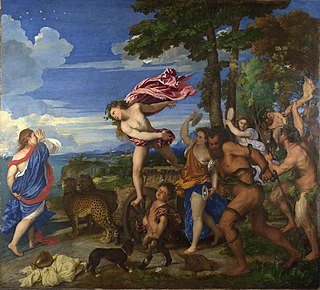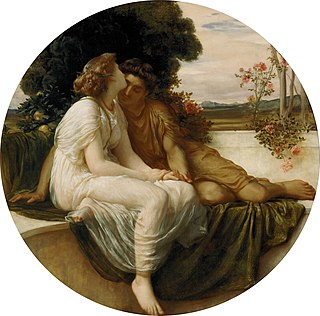
Gaius Valerius Catullus, known as Catullus, was a Latin neoteric poet of the late Roman Republic. His surviving works remain widely read due to their popularity as teaching tools and because of their personal or sexually explicit themes.

Quintus Ennius was a writer and poet who lived during the Roman Republic. He is often considered the father of Roman poetry. He was born in the small town of Rudiae, located near modern Lecce, a town founded by the Messapians, and could speak Greek as well as Latin and Oscan. Although only fragments of his works survive, his influence in Latin literature was significant, particularly in his use of Greek literary models.

In Greek mythology, Peleus was a hero, king of Phthia, husband of Thetis and the father of their son Achilles. This myth was already known to the hearers of Homer in the late 8th century BC.

In Greek mythology, Ariadne was a Cretan princess, the daughter of King Minos of Crete. There are different variations of Ariadne's myth, but she is known for helping Theseus escape from the Minotaur and being abandoned by him on the island of Naxos. There, Dionysus saw Ariadne sleeping, fell in love with her, and later married her. Many versions of the myth recount Dionysus throwing Ariadne's jeweled crown into the sky to create a constellation, the Corona Borealis.

Catullus 1 is traditionally arranged first among the poems of the Roman poet Catullus, though it was not necessarily the first poem that he wrote. It is dedicated to Cornelius Nepos, a historian and minor poet, though some consider Catullus's praise of Cornelius's history of the Italians to have been sarcastic.

Catullus 3 is a poem by Roman poet Gaius Valerius Catullus that laments the death of a pet sparrow (passer) for which an unnamed girl (puella), possibly Catullus' lover Lesbia, had an affection. Written in hendecasyllabic meter, it is considered to be one of the most famous of Latin poems.

Catullus 2 is a poem by Roman poet Gaius Valerius Catullus (c. 84 – c. 54 BCE) that describes the affectionate relationship between an unnamed puella ('girl', possibly Catullus' lover, Lesbia), and her pet sparrow. As scholar and poet John Swinnerton Phillimore has noted, "The charm of this poem, blurred as it is by a corrupt manuscript tradition, has made it one of the most famous in Catullus' book." The meter of this poem is hendecasyllabic, a common form in Catullus' poetry.
Catullus 101 is an elegiac poem written by the Roman poet Gaius Valerius Catullus. It is addressed to Catullus' dead brother or, strictly speaking, to the "mute ashes" which are the only remaining evidence of his brother's body.

Catullus 7 is a poem by Catullus addressed to his mistress Lesbia. Similar to Catullus 5, this poem revels in counting kisses, with a touch of stellar voyeurism.

Catullus 4 is a poem by the ancient Roman writer Catullus. The poem concerns the retirement of a well-traveled ship. Catullus draws a strong analogy with human aging, rendering the boat as a person that flies and speaks, with palms and purpose.

The Catalogue of Women —also known as the Ehoiai —is a fragmentary Greek epic poem that was attributed to Hesiod during antiquity. The "women" of the title were in fact heroines, many of whom lay with gods, bearing the heroes of Greek mythology to both divine and mortal paramours. In contrast with the focus upon narrative in the Homeric Iliad and Odyssey, the Catalogue was structured around a vast system of genealogies stemming from these unions and, in M. L. West's appraisal, covered "the whole of the heroic age." Through the course of the poem's five books, these family trees were embellished with stories involving many of their members, and so the poem amounted to a compendium of heroic mythology in much the same way that the Hesiodic Theogony presents a systematic account of the Greek pantheon built upon divine genealogies.

Catullus 12 is a poem by the Roman poet Catullus. In it, he chides Asinius Marrucinus for stealing one of his napkins, calling it uncouth and noting the disapproval of his brother, Pollio. Note the reversal of the praenomen and nomen in the first line. While "Asini Marrucine" could be translated simply as "Asinius Marrucinus", the inverted word order introduces the alternative meaning "Marrucinus [son] of a jackass". Napkins in Ancient Rome were handmade and therefore far more valuable than they are today; also, Catullus has a sentimental attachment to the napkins, as they were a gift from two close friends, Fabullus and Veranius. In comparison to Catullus's other invective poetry, this is relatively light: the main point of the poem could be to praise Pollio rather than to chide Marrucinus.
The Cypria is a lost epic poem of ancient Greek literature, which has been attributed to Stasinus and was quite well known in classical antiquity and fixed in a received text, but which subsequently was lost to view. It was part of the Epic Cycle, which told the entire history of the Trojan War in epic hexameter verse. The story of the Cypria comes chronologically at the beginning of the Epic Cycle, and is followed by that of the Iliad; the composition of the two was apparently in the reverse order. The poem comprised eleven books of verse in epic dactylic hexameters.

Bacchus and Ariadne (1522–1523) is an oil painting by Titian. It is one of a cycle of paintings on mythological subjects produced for Alfonso I d'Este, Duke of Ferrara, for the Camerino d'Alabastro – a private room in his palazzo in Ferrara decorated with paintings based on classical texts. An advance payment was given to Raphael, who originally held the commission for the subject of a Triumph of Bacchus.

Martin Litchfield West, was a British philologist and classical scholar. In recognition of his contribution to scholarship, he was awarded the Order of Merit in 2014.

Catullus 5 is a passionate ode to Lesbia and one of the most famous poems by Catullus. The poem encourages lovers to scorn the snide comments of others, and to live only for each other, since life is brief and death brings a night of perpetual sleep. This poem has been translated and imitated many times.

Catullus 45 is a poem by the Roman poet Catullus, describing the love between a fictional couple called Acme and Septimius. It is an over-the-top love poem that is ever so slightly tongue-in-cheek.

L'Arianna is the lost second opera by Italian composer Claudio Monteverdi. One of the earliest operas in general, it was composed in 1607–1608 and first performed on 28 May 1608, as part of the musical festivities for a royal wedding at the court of Duke Vincenzo Gonzaga in Mantua. All the music is lost apart from the extended recitative known as "Lamento d'Arianna". The libretto, which survives complete, was written in eight scenes by Ottavio Rinuccini, who used Ovid's Heroides and other classical sources to relate the story of Ariadne's abandonment by Theseus on the island of Naxos and her subsequent elevation as bride to the god Bacchus.

In classical studies the term epyllion refers to a comparatively short narrative poem that shows formal affinities with epic, but betrays a preoccupation with themes and poetic techniques that are not generally or, at least, primarily characteristic of epic proper.

The Aegimius is a fragmentary Ancient Greek epic poem that was variously attributed to Hesiod or Cercops of Miletus during antiquity. The "Aegimius" of the title was surely the son of Dorus, but the surviving fragments have nothing to do directly with this figure, and, despite his status as title character, it cannot be inferred from the available evidence that the poem was primarily concerned with the Dorian king. Instead other myths, such as those concerning Io, Theseus, and the golden fleece, are found among the handful of fragments preserved in other ancient authors as quotations and paraphrases.

















